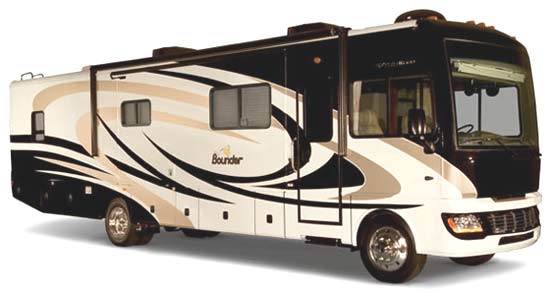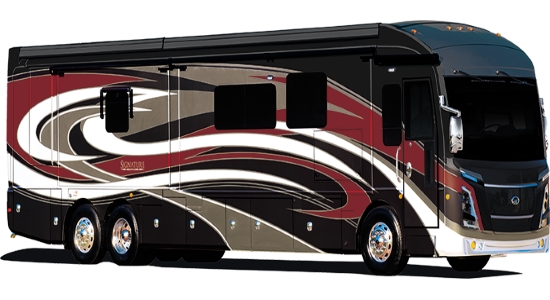Class A Motorhomes
Class A Motorhomes are the King of the Highway. They are made as either a Diesel or Gas, with Diesel being the more expensive to purchase.
How do you tell the difference between a Gas or Diesel Class A Motorhome? There are several "tricks" to watch for.
The Gas version will have some type of a grill in the front to allow the radiator to cool the engine. It will also have the front wheels very forward and close to the very front of the vehicle itself - just like a car or conventional truck would have. The front door will be therefore further back on this type of vehicle as well. The placement of the wheels being so far forward will require that.
On the inside, it will have a large box - called a "dog-house", over the engine area. Since the engine is up front on almost all Gas Class A Motorhomes, it has to be accessible from the inside of the RV as well as thru the front grill. Because of this very restricted space, it can be rather expensive to work on a Gas engined RV. Requires the strength of a large man, but the size of a doll to actually work on it!!
The rear bedroom models can be a little larger versus a diesel since the engine area is not under the bed, like it would be on a diesel RV.
 Class A Gas Motorhome - Grill for front Radiator, Front Wheels very forward, Front Door further back.
Class A Gas Motorhome - Grill for front Radiator, Front Wheels very forward, Front Door further back.The Diesel version of Class A Motorhomes will be obvious, once you get used to the differences between them. The diesel version will also just plain look and actually be "beefier" in appearance. Just like a city bus, the front wheels are further back and typically under the driver seat. Makes for a totally different steering experience too!!
The front door will be right in front between the wheels and what would be a bumper if it had one. Some will have a side door much further back, but the floor plan is 90% of the time a up-front door.
The engine will be below the bedroom area in the back of the RV. Most engine covers are spring loaded on hinges so the engine is very accessible actually. The engine and transmission are all right by the rear wheels so it will have a very short driveshaft.
The diesel engine RV will by its very nature have a heavier duty frame, transmission, air brakes, etc. I remember when we were making our decision as to what to buy - especially, as fulltimers - we decided very early on we wanted the heavy dutiness of a diesel!
Class A Motorhomes
Another great advantage of a diesel model is it can handle more weight and therefore amenities and options are much more plentiful. Again, the engine, transmission and air brakes make it a more reliable and safer vehicle to stop. Getting going is never an issue - stopping on a serious downhill grade is sooooo much easier with air brakes and an engine brake device of some kind!
For further clarifications, go to our dedicated page for a Class A Diesel and the Gas Class A Motorhomes.
